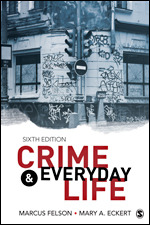Crime and Everyday Life
A Brief Introduction
- Marcus Felson - Texas State University, USA
- Mary A. Eckert - MA Eckert Consulting, LLC
“A brief easy-to-read book on crime and crime prevention based on the routine activity approach and opportunity theory.”
“A concise, intuitive, and well-written book that could be used as a text in crime analysis courses or as a supplementary reading in course such as criminology or nature of crime.”
“This is a well-written textbook, providing information on how to effectively reduce crime. I love the way the text is structured and the examples used to support material covered in each chapter. The text is well-written, easy for students to follow, and overall, just an interesting text.”
“Crime and Everyday Life is a text with a down-to-earth approach to crime causation and crime prevention. The book is relatable to students interested in pursuing careers in law enforcement, social work, counseling, teaching, urban planning, and many other professions not typically thought of as being related to crime.”
“It’s very accessible to a wide array of students.”
“This text is fun to read—it's seamless, light, and readable while remaining the most informative text out there for around two decades. Material in this text sticks with students. I've said it for years, this is the one book criminal justice students must read.”


